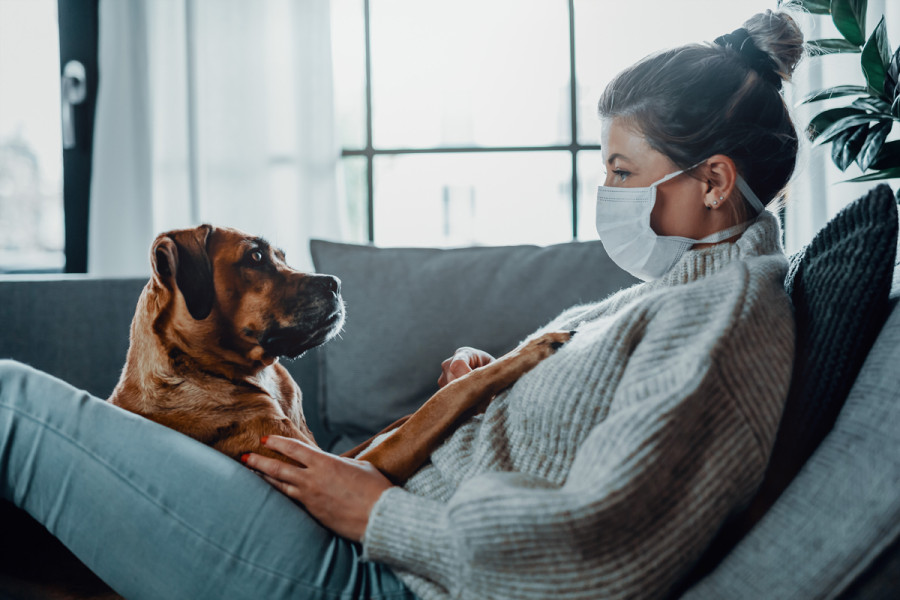 16.12°C Kathmandu
16.12°C KathmanduWeekender
Home with the pets
Some are reveling in the constant attention that comes with their families being marooned at home whereas some don’t seem to have any idea that their owners’ routines have changed—or if they do, they don’t care.
Pooja Lakhey
Tommy wakes up every day, excited as ever. Today, like the past 94 days, all his humans are working from home. On a regular day, before the pandemic, he barely got to play with everyone. But ever since the lockdown was placed by the government, Tommy and thousands of his fur friends in and around Nepal have been enjoying the company of their families 24/7.
Sumit KC, who lives with three dogs, agrees with Tommy’s excitement. “My dogs were used to spending most of their time with my parents, who due to their age, could hardly play with them. But ever since the lockdown, I’ve been taking all three of them for daily morning walks. I’m guessing they love it because I don’t need a 5 am alarm anymore; they wake me up so they can head out,” he says.
Anima Pradhan, on the other hand, says her cat Phoebe has shown no such change in admiration towards her throughout the lockdown period. “Named after the hit show Friends, Phoebe is a quiet cat and I like that about her,” says Anima. “I’ve heard from my friends about how their dogs have become whinier during the lockdown but I’m thankful that she hasn’t shown any changes in her behaviour.”
Whether you’re a dog person like Sumit or a cat person like Anima, or just an animal person in general, you will understand how having another creature besides humans in your home has been a boon during the quarantine days. True, your furry comrades have made surviving pandemic a little easier but if we go back three months, there were cases of abandoning pets due to the fear of coronavirus. In the wake of uncertainties, people weren’t sure if it was safe to have them aboard. However, CDC has debunked it and said that pets cannot transmit the virus to humans.
Dr Pranav R Joshi from Vet For Your Pet, who’ve had few worried clients, says, “There were cases of tigers in Bronx Zoo testing positive for coronavirus and a few rumours here and there about cows in India testing positive too. Evidently, this did raise a few questions from pet owners who consult with me but I convinced them that it was safe to have pets during the pandemic as there is no proof of animals transmitting the virus to humans.”
Similarly, a spokesperson for Catmandu Lovers, a home-based private organisation for orphaned newborn kittens, says, “A few people were concerned about cats spreading coronavirus but transmission has only been recorded from humans to animals so we’ve assured them that cats are not CODIV-19 carriers. However, we do advise people to wash their hands before handling the pets to avoid the risk of spreading the disease as kittens, in particular, have vulnerable immune systems.”
These weren’t just the problems that the poor pets faced. According to Joshi, he has seen quite a few cases of obesity in pets in the past three months. “For the first few weeks, people were convinced that it was the end of the world so there were no restrictions in their eating habits, and the same was seen in pets too. That did change with time but pet owners must always remember that pets need four basic things: fresh food, fresh water, exercise, and grooming.,” he says. “Even grooming should be done at home only if you know how to. We’ve had emergency cases of dogs coming in with wounds after their owners gave them haircuts.”
This isn’t the first time that pets have weathered a pandemic lockdown. During the 1918 flu, pet owners put face masks on their cats and dogs, a physical representation that pets were struggling with the outbreak just as much as people were.
A century later, we aren’t exactly masking our dogs or cats, but that doesn’t mean they aren’t affected. Some pets are revelling in the constant attention that comes with their owners being marooned at home. Some don’t seem to have any idea that their owners’ routines have changed—or if they do, they don’t care.
Your pet has never spent so much time with you, and received so much attention, as it has in the last three months. And however boring you actually are, pets everywhere are probably wondering how they ever survived without you around, 24/7. So now, what's going to happen when you have to go back to work?
Your cat or dog will doubtless find some memorable way of letting you know just how they feel. Will it be chew marks on your favourite pair of shoes? Will it be a little misbehaviour on the sofa? Will they simply disappear for 24 hours, hiding in some forgotten corner in the garden, while you organise a search party?
“When it comes to attachment, pets are like babies so there will no doubt be tons of cases of separation anxiety once things go back to normal,” says Joshi. “Now more than ever, you must maintain a proper attachment/detachment balance if you haven’t already.” How can one achieve that? “The simplest way to do so in case of dogs, which I suggest to most of my clients too, is through exhaustion. Try to exhaust them with exercises; the best one is to go up and down the stairs at home for 45 minutes each in the morning and evening.” But what will exhaustion do, if you may ask? “Once they’re exhausted, they prefer to rest on their own. If you do this routinely, they’ll get used to it and there’ll be fewer cases of separation anxiety,” he adds.
If you’re reading this and having separation anxiety from a pet that you don’t even own, Catmandu Lovers is probably the best place to reach out to. Their adoption procedure involves an interview with the person who is interested, explanation of the care and basic items that are expected by us for kitten care and education if the person has never had a kitten before. If they meet these requirements then they arrange a house/room visit to ensure that it is a suitable environment for the cat/kitten. When both parties are happy the agreement is signed which also states that sterilisation is compulsory when the kitten is old enough, which is complimentary.















